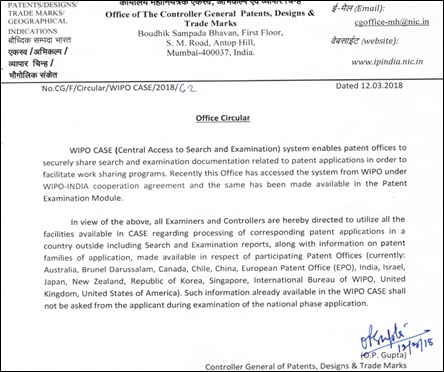The Indian Patents Act, 1970 requires an Applicant for a patent to keep the Indian Patent Office informed about corresponding applications that are filed outside India. This article talks about the information required by the IPO regarding foreign applications, timeline for furnishing such information and the consequences of failure to provide such information. Read more...
Section 8 of the Indian Patents Act relates to furnishing information of foreign applications with the IPO. SECTION 8(1) of the Indian Patent Act mandates an Applicant to file an undertaking at the time of filing a Patent Application in India that the Applicant shall keep updating the Indian Patent office about the correspondence applications filed if any in foreign jurisdictions. Such updates have to be provided in Form 3 (Rule 12 (1)) till the date of grant of the Patent in India. Whereas, information under Sec 8 (2) has to be furnished when the Controller seeks detailed particulars corresponding to the foreign applications at any time during the prosecution of the Indian patent application.
"(1) Where an applicant for a patent under this Act is prosecuting either alone or jointly with any other person an application for a patent in any country outside India in respect of the same or substantially the same invention, or where to his knowledge such an application is being prosecuted by some person through whom he claims or by some person deriving title from him, he shall file along with his application or subsequently within the prescribed period as the Controller may allow—
(a) a statement setting out detailed particulars of such application; and
(b) an undertaking that, up to the date of grant of patent in India, he would keep the Controller informed in writing, from time to time, of detailed particulars as required under clause (a) in respect of every other application relating to the same or substantially the same invention, if any, filed in any country outside India subsequently to the filing of the statement referred to in the aforesaid clause, within the prescribed time.
2) At any time after an application for patent is filed in India and till the grant of a patent or refusal to grant of a patent made thereon, the Controller may also require the applicant to furnish details, as may be prescribed, relating to the processing of the application in a country outside India, and in that event the applicant shall furnish to the Controller information available to him within such period as may be prescribed."
Timeline to file information under section 8
|
Section 8 (1), Rule 12 (2) |
If the other convention/NP applications were filed before the Indian convention/NP application was filed, the 6-month deadline is calculated from the Indian filing date. |
If the other convention/NP applications were filed after the Indian convention/NP application was filed, the 6-month deadline is calculated from the date of filing of each corresponding foreign application. |
|
Section 8 (2); Rule 12 (3) |
Within 6 months from the date of communication from the controller seeking such details. |
|
Non-compliance of Sec 8 can be a ground for pre-grant, post-grant opposition and revocation under section 25(1)(h), 25(2)(h) and Sec 64(1)(m), respectively. There has been instances wherein the non-compliance of section 8 information has been used as one of the effective tools to revoke a patent.
|
Ajanta Pharma Limited v. Allergan Inc., Allergan India PVT. LTD |
Allergan's patent IN212695 was revoked |
|
Hindustan Unilever Limited's patent by Intellectual Property Appellate Board |
Hindustan Unilever Limited's patent IN 195937 was revoked. |
It shall be noted that the burden of proof lies on the Defendant (infringing the patent) to show that the primafacie case of section 8 has not been met by the Plaintiff. A mere statement without any facts and evidence to support that there has been violation of section 8 cannot be considered to institute a proceeding. In FRESENIUS KABI ONCOLOGY LIMITED V. GLAXO GROUP LIMITED & ANR, the FRESENIUS KABI ONCOLOGY LIMITED V. GLAXO GROUP LIMITED & ANR had failed to file furnish any facts and evidence to support their revocation petition.
Roche Vs Cipla decision: A landmark judgement was passed by the Delhi High Court in Roche Vs Cipla case on 2008 stating that a Patent cannot be revoked solely on the ground of non-compliance of section 8.
156. Consequently, the ground of violation of Section 8 read with Section 64(1)(m) is made out. However, still there lies a discretion to revoke or not to revoke which I have discussed later under the head of relief. Under these circumstances, even in case, the said compliance of Section 64(1)(m) of the Act has not been made by the plaintiffs, still there lies a discretion in the Court not to revoke the patent on the peculiar facts and circumstances of the present case. The said discretion exists by use of the word - may II under Section 64 of the Act. Thus, solely on one ground of non-compliance of Section 8 of the Act by the plaintiffs, the suit patent cannot be revoked"
WILFUL or UNINTENTIONAL SUPRESSION OF FACT
In KONINKLIJKE PHILIPS VS SUKESH BEHL CASE, the Delhi High Court stated that it is important to analyse if there has been suppression of information by the Plaintiff. Moreover, one has to consider if such suppression of fact was wilful or unintentional. Unintentional suppression of facts and information may be considered as one of the grounds to avoid revocation of patent under section 64 (1) (m). In this context, it is worth mentioning "Philips Electronics Vs. Maj (Retd). Sukesh Behl" case.
Philips Electronics sued Maj (Retd). Sukesh Behl, Proprietor of Pearl Engineering company for allegedly infringing Patent: No: 218255 entitled "METHOD OF CONVERTING INFORMATION WORDS TO A MODULATED SIGNAL" on 2012. The defendant filed a revocation petition under section 64 (1)(m) as the patentee or plaintiff failed to comply with Section 8 of the Act. The defendant contented that the plaintiff suppressed the vital information of the foreign applications corresponding to same or substantially same invention filed in India.
As a counter argument, Philips submitted an affidavit stating that additional information was inadvertently missed out by paralegal who failed to photocopy the back side of a document while submitting the application.
Decision of the Delhi High Court:
14. It requires to be noted that while the Plaintiff does not deny that a part of the information concerning the pending foreign applications was inadvertently not disclosed, there is no admission as to the withholding of that information being deliberate or that there was wilful suppression of such information. That surely would be a matter for evidence. Further, the question whether the non-disclosure of the above information contained on the reverse of the first page in the first instance before the COP was material to the grant of the patent raises a triable issue. It is not possible at the present stage for the Court to form a definitive opinion on the above aspects. If at the end of the trial the Court, after examining the evidence, agrees with the Defendants that the information that was withheld was material to the grant of the patent itself, it might proceed to revoke the patent. Alternatively, it might disagree with the Defendant and decline to revoke the patent. In other words, that determination would have to await the conclusion of the trial. For the aforementioned reasons, the Court is of the view that it is not possible to grant the prayer made in this application by the Defendant under Order XII Rule 6 CPC."
Moreover, recently the Indian patent office has issued a notification instructing the Examiners and Controller's to utilise the WIPO case system and directed not to ask the Applicant's about such details during prosecution of the national phase application.

CONCLUSION:
The purpose of inclusion of section 8 in the Indian patent Act is clearly mentioned in the Ayyangar report.
"It would be of advantage therefore if the applicant is required to state whether he has made any application for a patent for the same or substantially the same invention as in India in any foreign country or countries, the objections, if any, raised by the Patent offices of such countries on the ground of novelty or un patentability or otherwise and the amendments directed to be made or actually made to the specification or claims in the foreign country or countries."
As mentioned in the Ayyangar report produced above, the sole purpose of submission of section 8 information to ease the prosecution of the patent application and help the Patent Examiner to prosecute the Patent application. Submission of Section 8 information is a procedural requirement to be complied by the Applicant till the grant of the patent. Non -compliance of such a procedural irregularity should not result in revocation of a patent that has overcome the hurdles of novelty and inventive step. It has been observed that the Delhi High Court has also stated the same in Roche Vs Cipla case. Further, prior to passing any harsh judgement against a patent, it is advisable to enquire if failure to comply with section 8 is done deliberately or unintentional. With the case law discussed in the preceding paragraphs it is worth mentioning that the jurisprudence with respect to section 8 is evolving. Procedural irregularity should not be considered as one of the tools to revoke a patent. Instead in case of non-compliance of such information, the Applicant should be given an opportunity to furnish such details, failure of complying to this opportunity may be considered to take a decision. Moreover, to avoid any such repercussions it is advisable that the Applicant and the representatives of the Applicant should diligently comply with Section 8, non-compliance of which would be used as an effective tool to invalidate a patent.
The content of this article is intended to provide a general guide to the subject matter. Specialist advice should be sought about your specific circumstances.
